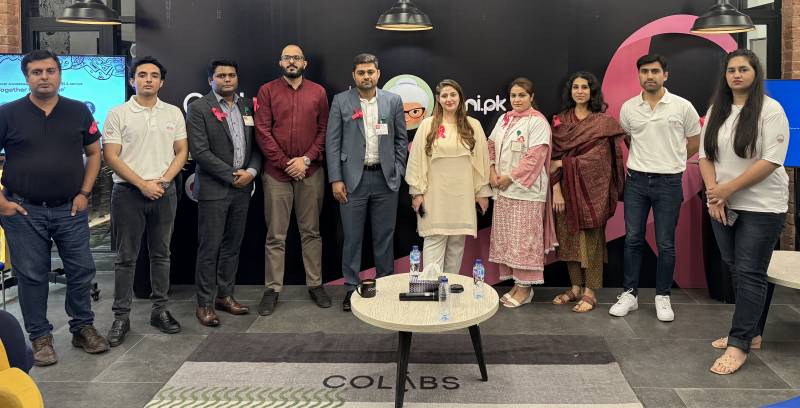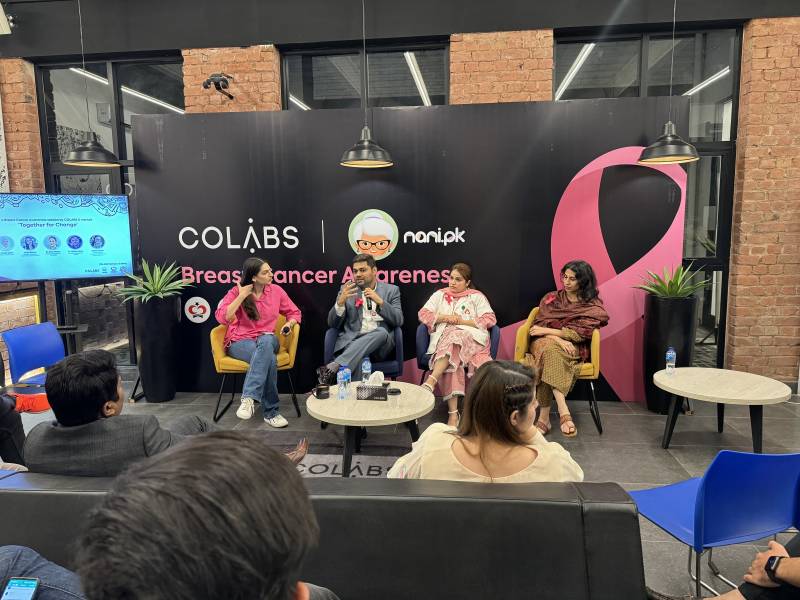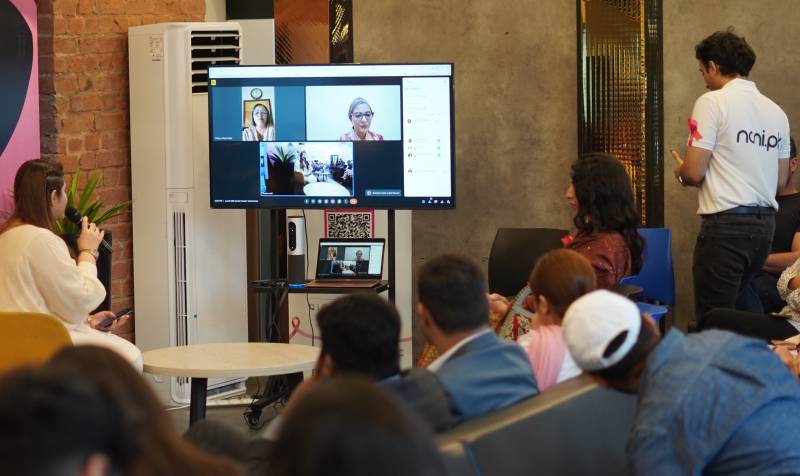Nani, the innovative startup dedicated to empowering women, recently partnered with COLABS, a co-working space, to host an inspirational breast cancer awareness session on October 25th at the COLABS premises in Gulberg.
The event, aptly named 'Together for Change,' held in collaboration with Aga Khan University Hospital (AKUH) and Shaukat Khanum Memorial Cancer Hospital (SKMCH) brought together a diverse group of inspiring guests and experts to tackle the vital issue of breast cancer awareness, early detection, and the importance of emotional and physical well-being in a woman’s health journey.
The event featured an impressive lineup of guests, including Dr. Hanan Selim, award-winning author, global speaker and the founder of Tackle & Talk (an online counseling platform), Amna Qamar, the founder of One Drum (an initiative promoting mindfulness and self-connection through drumming circles) and a two-time cancer survivor, Dr. Kinza Manan and Dr. Farhan Jabbar from the renowned Aga Khan University Hospital (AKUH), and Shireen Gheba, a well-known artist, writer, and philanthropist, also a cancer survivor.
Bushra Latif, the founder of Nani, was the host at the event and had the honor of interviewing the esteemed panelists, facilitating an engaging and mindful conversation on the subject of breast cancer awareness.
Dr. Hanan Selim and Shireen Gheba, while attending virtually, engaged the audience with informative discussions on early detection and the importance of emotional support. Dr. Kinza Manan, Amna Qamar, and Dr. Farhan Jabbar shared their insights and experiences with the audience present at the COLABS venue.
Naqqash Haider, Regional Coordinator Central Punjab at AKUH, also graced the event and facilitated AKUH's participation in this meaningful initiative.
The 'Together for Change' event was designed to raise awareness about breast cancer and encourage women to prioritize both their emotional and physical well-being by scheduling regular check-ups. The event's mission is particularly vital in Pakistan, where breast cancer remains a taboo topic.
“Respond promptly to any symptom, don’t delay it,” stated Shireen Gheba. “One needs to realise the importance of starting treatment as soon as possible. One must be proactive. Take control of your treatment, especially where, and who will treat you. Try to manage your finances yourself too. It’s a long journey, so have at least two to three caregivers who can help you manage your treatment and you. Choose your treatment spiritually also, as well as financially. Sell jewelry and plots if you have to, but re-invest some of it, to keep it for any more health issues later on, God forbid.”
According to studies, Pakistan has the highest incidence of breast cancer among Asian countries. Approximately 1 out of every 9 women in Pakistan is likely to experience breast cancer at some point in her life. Shockingly, about 77% of invasive breast cancer cases occur in women over 50. However, early detection can significantly improve survival rates, reaching as high as 90%.
Breast cancer awareness in Pakistan goes beyond mere knowledge; it involves debunking myths and encouraging healthy lifestyle adjustments. And also, open-hearted, candid conversations. Pakistan requires a concerted effort to educate women about breast cancer, promote breast self-examination, and advocate for mammographic screening.
“Our passionate Breast Cancer Awareness event, executed in partnership with COLABS and in alliance with AKUH and SKMCH have forged a compelling catalyst for transformation – whether great or small. We extend our heartfelt gratitude to each participant, speaker, and supporter who united with us. Together, we're not merely spreading awareness; we're molding a healthier and more promising future for women in Pakistan,” Bushra Latif said.
‘Together for Change,’ orchestrated by Nani, COLABS, and their esteemed partners, envisions a brighter, healthier future for women in Pakistan.
By uniting these vital stakeholders and encouraging informed discussions, the event aspired to foster a cultural shift where breast cancer awareness and proactive health measures become intrinsic and much-needed components in Pakistani society.




